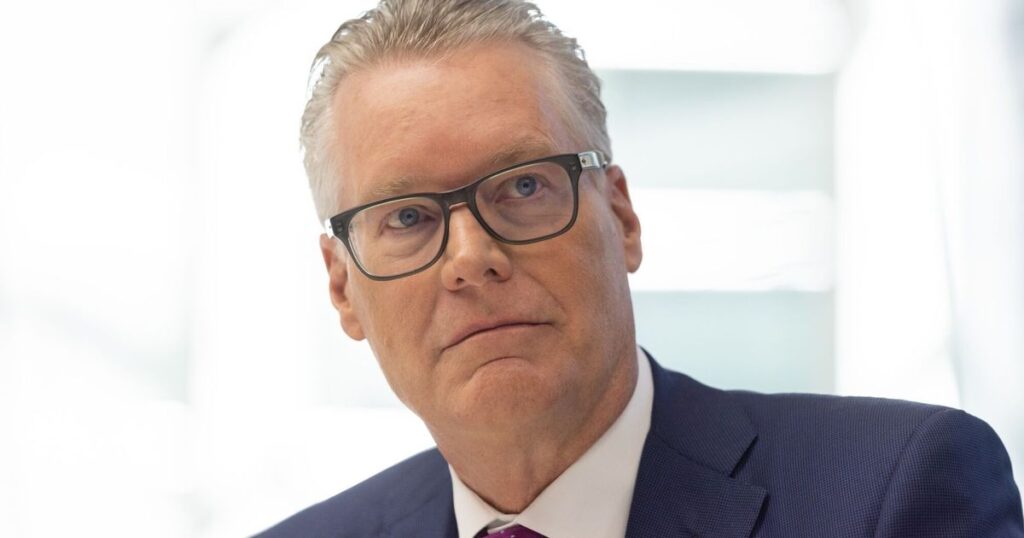Delta Air Lines reinstated a profit outlook for the year and said travelers are coming back, prompting its stock to surge amid a fresh sense of confidence in the beaten-down U.S. consumer.
The carrier expects an adjusted profit of $5.25 to $6.25 a share this year, according to a statement on Thursday as Delta reported better-than-expected second-quarter results. Delta’s projections sent its shares up about 12%, their highest level in more than three months, and pulled up rival airlines.
Travel in the U.S. is recovering after approval of President Donald Trump’s tax-cut and spending package and progress in tariff discussions, CEO Ed Bastian said in an interview. Corporate travel is strengthening, and consumers have become “a little numb” to the ongoing trade disputes, choosing to book travel again in the latter part of the year.
“People are starting to understand with clarity where things are headed and that allows them to start making plans, whether to travel or invest in a business,” Bastian said. The current environment, he said, “is incredibly stable.”
Delta was the first major U.S. airline to pull its outlook in April after Trump launched his campaign to reset global trading rules, rattling markets, businesses and consumers alike with often chaotic tariff declarations. The U.S. economy has nevertheless proven resilient, and Delta’s new forecast suggests that other companies will grow more confident again — and not only airlines.
Bastian told analysts on a call discussing its results that tariffs wouldn’t do “anything but hurt U.S. companies and consumers.”
The midpoint of Delta’s range tops the average $5.35 expected by analysts, though it’s lower than the January forecast, when Delta had said annual adjusted earnings would surpass $7.35.
Delta rose about 12% on Thursday. American Airlines and United Airlines, which reports earnings next week, both saw similar surges, while Alaska Air rose nearly 9%.
“It is going to be difficult for other airlines that might have withdrawn guidance, or provided a wide range or scenario analysis, to not narrow that in a little bit,” said Liz Ann Sonders, chief investment strategist at Charles Schwab. However, Sonders found Bastian’s use of the word “stable” to describe the economy “a little bit odd, or at odds, with what has been an unstable backdrop, particularly from a tariff perspective.”
Sonders sees a bifurcated, or K-shaped, economy where those at higher income levels are doing well but there’s “pressure on lower-end consumers,” she said in a Bloomberg TV interview.
International premium and loyalty travel remain bright spots, although demand for economy-class trips both in the U.S. and abroad has stalled. Carriers are already cutting fares to help fill planes, but demand still falls off on days or weeks that aren’t peak travel times.
Bastian underscored this point on the analyst call, saying the carrier was struggling to fill seats in the main economy cabin, particularly during off-peak periods.
Business travel, too, remained down 15%-20% since the coronavirus pandemic decimated air travel, Delta said.
Airline shares have been battered, with the S&P Supercomposite Airlines Index falling almost 16% this year through Wednesday, compared with about a 6.5% gain in the S&P 500.
“Given the level of uncertainty, we do not expect many other US airlines to restore 2025 earnings guides,” Savanthi Syth, a Raymond James analyst, said in a note Thursday.
Delta’s results were helped by higher sales of premium tickets, loyalty program credit card spending, payments from American Express, cargo and Delta’s in-house maintenance and repair operations. Those high-margin areas combined accounted for 59% of total sales in the period.
The aviation industry was hit by a series of accidents and air traffic control disruptions in the first half, along with consumer fears around inflation and trade that cratered domestic demand early in 2025. Bastian said in an interview with CNBC that the second half should get the company back on track.
The industry succeeded in making “significant” cuts to seat capacity, of around 4 percentage points through the summer, and expects the level to land down close to around 1% by September, Delta President Glen Hauenstein told analysts. Delta said earlier that it would join other carriers in slowing capacity growth after the summer season ends in hopes of raising fares.
“We were anticipating growth this year and had built a plan for it to grow,” Bastian told Bloomberg. “We have reset our plan and now we are very focused on getting the capacity and growth out in the back half of the year.”
Bloomberg’s Lisa Abramowicz and Jonathan Ferro contributed.

